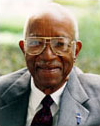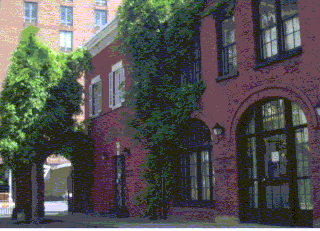
National Tsing Hua University is a public research university in Hsinchu City, Taiwan.
The American Council of Learned Societies (ACLS), founded in 1919, is a private, nonprofit federation of 75 scholarly organizations in the humanities and related social sciences. It is best known for its fellowship competitions which provide a range of opportunities for scholars in the humanities and related social sciences at all career stages, from graduate students to distinguished professors to independent scholars, working with a number of disciplines and methodologies in the U.S. and abroad.
The Adelphi Charter on Creativity, Innovation and Intellectual Property is the result of a project commissioned by the Royal Society for the encouragement of Arts, Manufactures & Commerce, London, England, and is intended as a positive statement of what good intellectual property policy is. The Charter was issued in 2004.

John Hope Franklin was an American historian of the United States and former president of Phi Beta Kappa, the Organization of American Historians, the American Historical Association, and the Southern Historical Association. Franklin is best known for his work From Slavery to Freedom, first published in 1947, and continually updated. More than three million copies have been sold. In 1995, he was awarded the Presidential Medal of Freedom, the nation's highest civilian honor.
The National Yang Ming Chiao Tung University School of Law is a postgraduate law school located on the campus of National Yang Ming Chiao Tung University in Hsinchu, Taiwan. NYCU Law began as the "Intellectual Property Management" Program in 1993, and then the Institute of Technology Law ("ITL") in 2000. The ITL was transformed into the National Chiao Tung University School of Law in 2015. In February 2021, because of the combination of National Yang-Ming University and National Chiao Tung University, the National Chiao Tung University School of Law was renamed the National Yang Ming Chiao Tung University School of Law. Its programs award advanced degrees including master's degrees as well as doctorate degrees. It is a postgraduate professional school, aiming to provide legal training for students already having bachelor's or more advanced degrees, and focuses on a cross-disciplinary legal education environment. Of note, NYCU Law stands out as one of the few law schools in Taiwan that teaches Anglo-American common law systems, alongside traditional civil law systems.
The University of Virginia College and Graduate School of Arts & Sciences is the largest of the University of Virginia's ten schools. Consisting of both a graduate and an undergraduate program, the College comprises the liberal arts and humanities section of the University. Edward Ayers was the dean of the College through July 1, 2007, when he was named the ninth President of the University of Richmond; Karen L. Ryan was named Interim Dean after his departure, and Meredith Jung-En Woo became dean on June 1, 2008. The College offers more than 45 undergraduate majors and more than 24 graduate programs. On July 1, 2014, Ian Baucom began his tenure as the Buckner W. Clay Dean of the College and Graduate School of Arts & Sciences after serving 17 years in Duke University's Department of English. Dean Baucom was a professor of English and directed the John Hope Franklin Humanities Institute at Duke.

HASTAC (/ˈhāˌstak/') also known as the Humanities, Arts, Science and Technology Alliance and Collaboratory, is a virtual organization and platform of more than 18,000 individuals and 400+ affiliate-institutions dedicated to innovative new modes of learning and research. HASTAC network members contribute to the community by sharing work and ideas with others via the open-access website, by hosting HASTAC conferences and workshops online or in their region, by initiating conversations, or by working collaboratively with others in the HASTAC network.
The National Humanities Center (NHC) is an independent institute for advanced study in the humanities. The NHC operates as a privately incorporated nonprofit and is not part of any university or federal agency. The center was planned under the auspices of the American Academy of Arts and Sciences, which saw a need for substantial support for academic research in the humanities, and began operations in 1978.
Established in 1988, the Consortium of Humanities Centers and Institutes serves as a site for the discussion of issues germane to the fostering of cross-disciplinary activity and as a network for the circulation of information and the sharing of resources within the humanities and interpretive social sciences. CHCI has a membership of over 200 centers and institutes that are remarkably diverse in size and scope and are located in the United States, Australia, Canada, China, Korea, Finland, Taiwan, Ireland, United Kingdom, and other countries.
Washington University in St. Louis has a broad array of centers for particular studies and research institutes. The following summary of many of these is organized by general field of inquiry.
Public humanities is the work of engaging diverse publics in reflecting on heritage, traditions, and history, and the relevance of the humanities to the current conditions of civic and cultural life. Public humanities is often practiced within federal, state, nonprofit and community-based cultural organizations that engage people in conversations, facilitate and present lectures, exhibitions, performances and other programs for the general public on topics such as history, philosophy, popular culture and the arts. Public Humanities also exists within universities, as a collaborative enterprise between communities and faculty, staff, and students.
The Franklin Humanities Institute (FHI) is an interdisciplinary humanities center at Duke University dedicated to supporting humanities, arts, and social science research and teaching. The institute's mission is to encourage humanistic inquiry throughout Duke campus and to raise public awareness of the humanities. Named after the prominent African American historian and civil rights activist John Hope Franklin, who retired from Duke in 1985 as the James B. Duke professor of History, the institute has also made a commitment to promote scholarship that enhances social equity, especially through research on race and ethnicity.

The Centre for Research in the Arts, Social Sciences and Humanities (CRASSH) is an interdisciplinary research centre within the University of Cambridge. Founded in 2001, CRASSH came into being as a way to create interdisciplinary dialogue across the University’s many faculties and departments in the arts, social sciences, and humanities, as well as to build bridges with scientific subjects. It has now grown into one of the largest humanities institutes in the world and is a major presence in academic life in the UK. It serves at once to draw together disciplinary perspectives in Cambridge and to disseminate new ideas to audiences across Europe and beyond.

The School of Humanities is one of the academic units of the University of California, Irvine. Upon the school's opening in 1965, the Division of Humanities was one of the five liberal arts divisions that the campus had to offer. Samuel McCulloch was appointed as UC Irvine's founding dean of Humanities 1963. The School hosts the Thesaurus Linguae Graecae and the University of California Humanities Research Institute.

Lisa Lowe is Samuel Knight Professor of American Studies and Ethnicity, Race, and Migration at Yale University. Prior to Yale, she taught at the University of California, San Diego, and Tufts University. She began as a scholar of French and comparative literature, and since her work has focused on the cultural politics of colonialism, immigration, and globalization. She is known especially for scholarship on French, British, and United States colonialisms, Asian migration and Asian American studies, race and liberalism, and comparative empires.
Stanford University has many centers and institutes dedicated to the study of various specific topics. These centers and institutes may be within a department, within a school but across departments, an independent laboratory, institute or center reporting directly to the Dean of Research and outside any school, or semi-independent of the University itself.

The New York University Graduate School of Arts and Science (GSAS) is a school within New York University (NYU) founded in 1886 by Henry Mitchell MacCracken, establishing NYU as the second academic institution in the United States to grant Ph.D. degrees on academic performance and examination. The School is housed in the Silver Center, several departments have their own buildings and houses around Washington Square. The graduate program at Courant Institute of Mathematical Sciences, although run independently, is formally associated with the graduate school.
The Walter Chapin Simpson Center for the Humanities, located in Seattle, Washington, is one of the largest and most comprehensive humanities centers in the United States. Housed in the College of Arts and Sciences at the University of Washington (UW), it offers UW scholars a spectrum of local opportunities for intellectual community and grant support that advances crossdisciplinarity, collaboration, and research while networking them nationally and internationally.

Duke Kunshan University(DKU) is a Chinese-American partnership of Duke University and Wuhan University to create a liberal arts and research university offering academic programs for students from China and throughout the world. DKU received approval from the Chinese Ministry of Education in 2013 and its curricula are also approved by the Jiangsu Provincial Education Bureau.
Jonathan Judaken is the Spence L. Wilson Chair in Humanities at Rhodes College. Judaken previously taught at the University of Memphis where he was the Dunavant Professor of History and Director of the Marcus Orr Center for the Humanities. His fields of expertise include European cultural and intellectual history, discussions of Jews and Judaism, race and racism, and post-Holocaust French philosophy. Judaken is a notable scholar of Jean-Paul Sartre and Sartre's relationship to Jews and Judaism and race and racism, as well as contemporary French Jewish philosophers.









